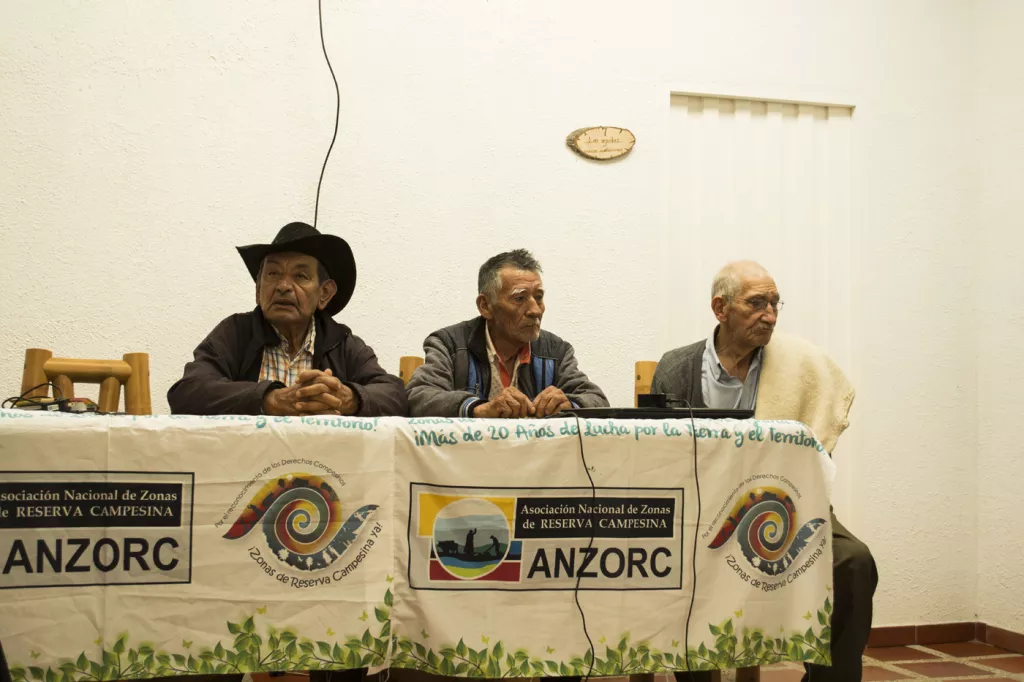Peasant leaders threatened and killed in Colombia

One of the main challenges that the Colombian government has, in terms of security, is to guarantee the lives of the social and peasant leaders. In relation to the Peasant Reserve Zones, 14 members of the National Association of Peasant Reserve Zones (ANZORC) have been murdered in 2018. If this tragic trend continues, this will be the most violent year since 2012. These are some of the data included in the diagnosis of safety and prevention carried out by the Project “Tramo a Tramo” (Stretch by stretch), which is being developed by ANZORC with Forum Syd and We Effect, with the support of the EU delegation in Colombia.
Despite the rural reform that was included as one of the main points of the peace agreement between the government and the FARC guerrilla, regressive laws on agrarian reform are being applied. To the already existing model of Economic and Social Rural Development Zones of Interest (ZIDRES), the new government is additionally proposing Strategic Zones of Agricultural Interest, both of which are models that compete and create conflict with the peasant reserve zones model.
Consequently, the struggle led by peasant organisations to establish their own reserve zones, is increasingly more conflictive and risky, due to the diverse interests involved, related to legal and illegal economical activities (mining, oiling, drug producing and trafficking, and agro-industrial production, among others).
This situation of permanent threat and death in dribs and drabs, in which the peasant movement has been in recent years, has generated technical skills within the organizations to produce statistics on the counting of their murdered and threatened members.
Carmenza Gómez, president of ANZORC, repeats again and again -with a choked voice and watery eyes- that the people from the Association are being killed because they are supporting the implementation of the peace agreement, specially by demanding the Integral Rural Reform and by supporting the crop substitution plan that the previous government was developing, despite its failures and delays. She knows that the testimonies from leaders of different regions have not been enough to reach public opinion and duty bearers. That is why the organizations that are carrying out the project "Tramo a tramo", have decided to systematize the diagnoses of the safety and risk situation of the Association, and also to present those cases with the highest levels of risk to the EU delegation in Colombia and to Michel Forst, special rapporteur of the United Nations for the situation of human rights defenders.
Within the diagnosis, whose main source is the Marcha Patriótica social and political movement, the following data stands out: between 2012 - 2018, 70 leaders of the different Peasant Reserve Zones in the country have been killed, being Antioquía, Cauca and Norte de Santander the departments with the highest levels of murders. Between the date of collecting this information (July) and the closure of this note (second week of August) the number of murders in 2018 adds up to 14. If this tragic trend continues in the coming days, this year will be the most violent in the last five years for the peasant leaders of the Reserve Zones.
A second report systematizes, in terms of security and prevention, the Organizational Capacity Index (ICO), one of the most complete diagnoses that currently exist on the status of the organisations that conform the Rural Reserves, and in which 57 of the 65 organizations that make up ANZORC were consulted. The results yielded valuable data for a detailed review by all authorities. Some figures are: 88.24% of the surveyed organizations claim to be victims of stigmatization, 52.94% of homicide and 21.57% of forced disappearance. When the question revolves around the alleged perpetrators of these events, the data is worrisome: 45 organizations of the 57 respondents state that the responsibility is on private companies, 43 point on armed groups in general, 42 on paramilitaries and the army, 37 on illegal groups associated with drug trafficking, 20 on the guerrillas and 8 on others.
All the above figures can be read with apparent ease; in a global world, showing numbers about people dying of hunger or killed because they are defending their territory results painfully obvious. These diagnoses presented to the international community, are a powerful example of how the peasant movement overcomes adversity, presenting to duty bearers their own methodologies to manage their territories, to protect the lives of all species and to materialize solidarity. It is an inspiring example of the complexity of the strategies to organize themselves carried on by groups of human beings which have been historically excluded, demonstrating their struggle to keep their communities alive by claiming empathy and otherness.
Andra nyheter

The power of people powered Public-Private Partnerships
Public–Private Partnerships (PPPs) are often discussed in terms of roads, power plants, housing, and other large infrastructure projects. But as discussed on the People’s Partnership Podcast, PPPs are...

ForumCiv’s social media accounts labelled as “extremist materials” in Belarus
Important message to our Belarusian followers. Any interaction with our content can now lead to legal consequences in Belarus. Please read the information below and take the necessary precautions for...

ForumCiv enters new strategic partnership
ForumCiv is proud to announce a new three-year strategic partnership with Sida, totalling SEK 137 million.